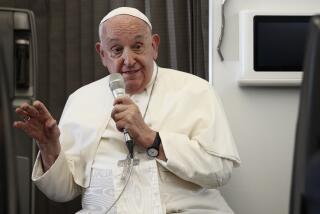Philippine Clergy Cautioned on Politics
- Share via
MANILA — The Philippines’ powerful Roman Catholic Church hierarchy told priests and nuns Friday to avoid direct political involvement in elections.
Cardinal Jaime Sin, archbishop of Manila, outlined the policy in a 15-page booklet that he said would be distributed around the sprawling Philippine archipelago.
The handbook contains questions and answers on the role of the church in the Philippines’ often tumultuous politics, and cites Vatican documents on the subject.
Candidates from across the political spectrum are competing for 24 Senate seats and 240 lower house seats in the elections on May 11.
Sin, a major critic of Ferdinand E. Marcos, the ruler replaced by Corazon Aquino in a revolt 13 months ago, called the booklet “a guidance” and acknowledged it stopped short of being an absolute ban on political involvement.
Sanctions Not Foreseen
Bishop Teodoro Bacani, who helped compile the pamphlet and who has written a book on the relationship between the church and politics in the Philippines, told reporters that the church would not necessarily take sanctions against priests and nuns who had a direct political role.
Bishops in individual regions could grant dispensations “if it is for the common good and the defense of the rights of the church,” Bacani said.
The Philippines has an estimated 5,000 priests and 9,000 nuns. About 85% of its 56 million people are Roman Catholic.
Many priests and nuns are involved in politics to some degree, and the leftist Ng Bayan party has said it will field three priests in its list of candidates for the Senate in the May election.
In a reference to the 20-year rule of Marcos, Bacani said church involvement in politics began “under Marcos oppression” and could not easily be unwound.
Priest’s Capture Told
By coincidence, the church document was made public in the wake of a report by the armed forces that they had captured one priest among the Communist guerrillas and charged a second priest with arms violations.
Col. Renato Motus, a deputy regional police commander in the central Visayas islands, said that weapons charges were lodged against Father Rogelio Arguelles after troops reported finding a hand grenade, ammunition and subversive literature in his rectory in rural Panay island.
The military announced Thursday that it had captured a priest with a band of New People’s Army rebels on Mindanao island.
In another development Friday, the government’s Philippine News Agency quoted Foreign Secretary Salvador Laurel as saying that he has ordered a probe into news reports that that the Soviet Union and Vietnam have offered weapons, money and training to Filipino Communist rebels.
Past Denials
Efforts to contact officials for comment at the Soviet and Vietnamese embassies failed Friday night. But Soviet officials have said repeatedly they are not aiding local rebels and have no intention of doing so.
For its part, the New People’s Army said the military had “patently fabricated” the reports and planted them in local newspapers. It also accused the military of exaggerating rebel casualty figures in the fighting between the guerrillas and the armed forces to impress “their patrons in Washington.”
Meanwhile, former Defense Secretary Juan Ponce Enrile called for a “realistic” attitude toward nuclear weapons possibly stored at U.S. military bases here.
Enrile told the Foreign Correspondents Assn. of the Philippines: “If you have a policy written in the constitution that prohibits the entry of nuclear weapons into our territory, what good are these American military facilities?” He referred to Clark Air Base and Subic Bay Naval Base.
U.S. Position
The United States has refused to confirm or deny the presence of nuclear weapons at the bases or on ships that call at Subic.
The constitution, approved last month, says, “The Philippines, consistent with the national interest, adopts and pursues a policy of freedom from nuclear arms in its territory.”
Enrile, whom President Aquino fired from her Cabinet after an alleged coup attempt by military officers close to him last November, said the Philippines should outlaw nuclear weapons only when it can afford to defend itself.
Nationalist and leftist groups have called for the dismantling of the U.S. bases, saying their presumed nuclear stockpiles expose the country to danger from nuclear accidents or a nuclear attack.
More to Read
Sign up for Essential California
The most important California stories and recommendations in your inbox every morning.
You may occasionally receive promotional content from the Los Angeles Times.










